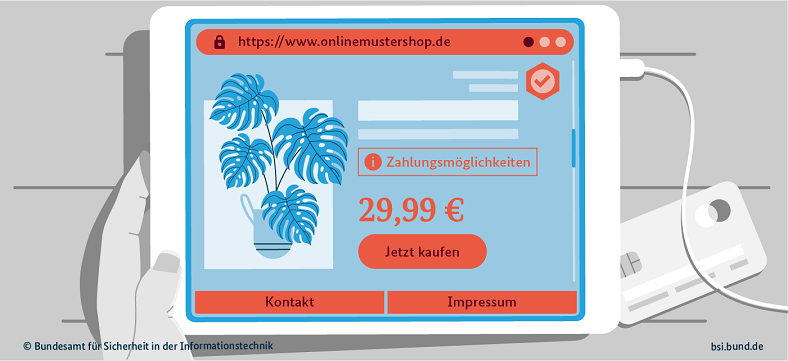How can I tell which online shops are secure?
Fake shops create a major problem for online shopping
Online shops offer almost limitless shopping opportunities on the move or without leaving your own four walls. Convenient payment options and delivery to your door guarantee a high level of convenience. Lurking behind some online shops, however, are criminals running fake shops.
Surprisingly cheap products are a common lure. Payment is then made in advance. Afterwards, the victims usually get a rude awakening: after the payment has been taken, the goods arrive damaged, if at all, or do not match the buyer's expectations. Our recommendation: Before purchasing, take a critical look at the company behind the online shop, the payment methods they offer and any user reviews that appear to be genuine.
Seven ways to recognise secure online shops
The following graphic includes examples of ways you can identify a secure online shop in the future. This section will cover the individual points in more detail and look at the special features of online auctions in particular.

In more detail: What should I look out for in web shops?
Before making any purchase, you should carefully check the online retailer in question. You will probably find this easier when ordering from better-known, larger sellers, as data and consumer protection agencies are more aware of them. Any shortcomings for a reputable online retailer would immediately have massive adverse effects on the company.
For sellers you have not heard of, you should check the following details before placing an order:
Does the trader provide full seller ID?
- Last name, first name and full address of the seller
- Information for quick contact (telephone number, e-mail, fax)
- Trade register and trade register number
- Company name and suffix showing its legal form
- Sales tax identification number
- Information on the supervisory authority (if the product requires a licence, e.g. pharmacist)
- Can you view the general terms and conditions?
- Is information available on data protection and data security?
- Is information available on the right of withdrawal, right of return and purchase price refund?
- What are the different payment options?
- Is there transparency on shipping costs, return costs and possible additional costs?
- Is there an e-mail confirmation when you complete the order process?
Fake shops with a URL that refers to a well-known brand appear on the Internet time and again. Among other things, they can be recognised by spelling mistakes in the descriptions, uniform and very low prices for all products, lack of an imprint, limited e-mail contact options or telephone numbers abroad. In addition, you can usually gain a good picture of a seller with the help of customer reviews or in forums. You can find relevant experiences in rating portals or research them on a search engine.
A seal of approval is another method online retailers often choose to prove they are genuine. These indicate that both the shop/seller and the various processes triggered by an order have been independently checked. Individual seals of approval have different verification methods and quality requirements for online shops
and do not always provide reassurance on the security of the online retailer. Check the minimum requirements of a quality seal before you trust it. Be aware, too, that online fraudsters also falsely and illegally mark websites with a seal in order to appear trustworthy. If you have any doubts at all, look for an alternative shop to complete your purchase.
Initiative D21 is an association of information society experts from politics and business that has defined quality criteria for online retailers. Based on these criteria, Initiative D21 recommends the following quality seals:

Please note, however, that the providers who grant a seal of approval only check the shops and ordering processes. A seal of approval cannot protect you from phishing, for example.
Online shopping: encrypted data transmission?
Regardless of the online shop and the desired payment method, always make sure that all data you transmit to an online shop is encrypted. You will recognise this by messages such as "You have requested a protected document..." or "You are about to view pages via a secure connection...". In addition, if the data connection is encrypted, there is an "s" after the letters "http" in the address line of the browser. Another indication of encryption: in many browsers, a small, closed padlock appears in the lower area or in the address line.
SSL certificates for online retailers
Some web shops try to indicate a secure shopping experience with SSL certificates from independent certification authorities. The website operators use Extended Validation SSL certificates (EV SSL certificate). An additional field is shown in the address line of the browser on the left, alternating the certificate and domain holder with the certification authority. In addition, depending on the browser and/or add-on used, the address line is (partially) coloured green. This lets you see even more quickly whether the website you are visiting is "genuine", allowing you to protect yourself more effectively against phishing attempts.
Providers of SSL certificates include: VeriSign, GoTrust, GlobalSign, TC TrustCenter Gmbh and Cacert. Companies receive an SSL certificate with unique and authenticated information. When issuing the certificate, the certification authorities check the identity of the certificate owner. VeriSign, for example, checks the existence of the company, the domain owner and their authority to request an SSL certificate. If you arrive at an encrypted page that does not have a valid certificate, you will receive a warning message.
What data does the shop/seller save?
Whenever you place an order on the Internet, you must provide the online retailer with some personal information in addition to your credit card or bank details. Our recommendation: Our recommendation: Make sure that you limit all information to the absolutely necessary data and only answer mandatory fields. A trustworthy shop/seller will ask you at the end of the ordering process what you want them to do with your data. This usually allows you to object to your data being passed on. If you wish to receive newsletters or promotional mailings, you must explicitly confirm this.
Unfortunately, it is not possible to prevent the shop/seller from saving the products and services you have ordered and thus automatically creating a profile of you. In addition to the product information stored by the seller, some sellers combine this data with cookies, which allow conclusions to be drawn about your surfing behaviour. After purchasing a certain product, you may therefore receive a product recommendation or an offer linked to your previous order or the surfing behaviour recorded by the provider when you log in to the webshop again.
10 tips for online auctions
Online auction sites are very popular. If you buy goods at auction on the Internet, you need to consider even more aspects than you do when making a "normal" online purchase. How to use online auctions:
- Check the seller ratings before you place a bid. Prioritise auctions where the homepage or at least the address of the seller is known.
- Check the product data carefully and ask the seller if you are unsure of anything. Ask for proof of origin/proof of purchase or guarantees, especially for higher-value products or new goods.
- Check the relevant section of the website to find out about the auction site's measures to provide security against fraudsters.
- Before paying, check whether you have received the seller's address details. If not, look them up.
- When transferring money, make sure that the seller and the account holder are identical. Avoid foreign bank transfers.
- If possible, use the escrow service offered by auction sellers for higher-value goods. This withholds the payment of the purchase price until you receive the goods.
- Be cautious if a (supposed) seller wants to sell you goods directly after an auction has ended - for example, on the grounds that a buyer has dropped out. Always ask the auction provider directly.
- If a seller seems suspicious to you, report this immediately to the auction site. Contact the police if you have been a victim of fraud. If you suspect that purchased goods are stolen goods, you should also report this to the police immediately - you may otherwise be liable to prosecution for receiving stolen goods.
- Alarm bells should ring if a seller tries to persuade you to send money via a different payment method than the one provided by the auction site.
- Do not comply with requests to submit a copy of your identity card. This applies regardless of whether you are buying or selling.
Online shopping - what to do in an emergency? The SOS card helps!
How quickly you can fall into the fraud trap when shopping online is also shown in our section "How does the Internet work? We share a fictional example of what can go wrong with online shopping and tips on action you can take.
You can download and print out the SOS card for online shopping which details further protective measures you can take against crime when shopping online.


